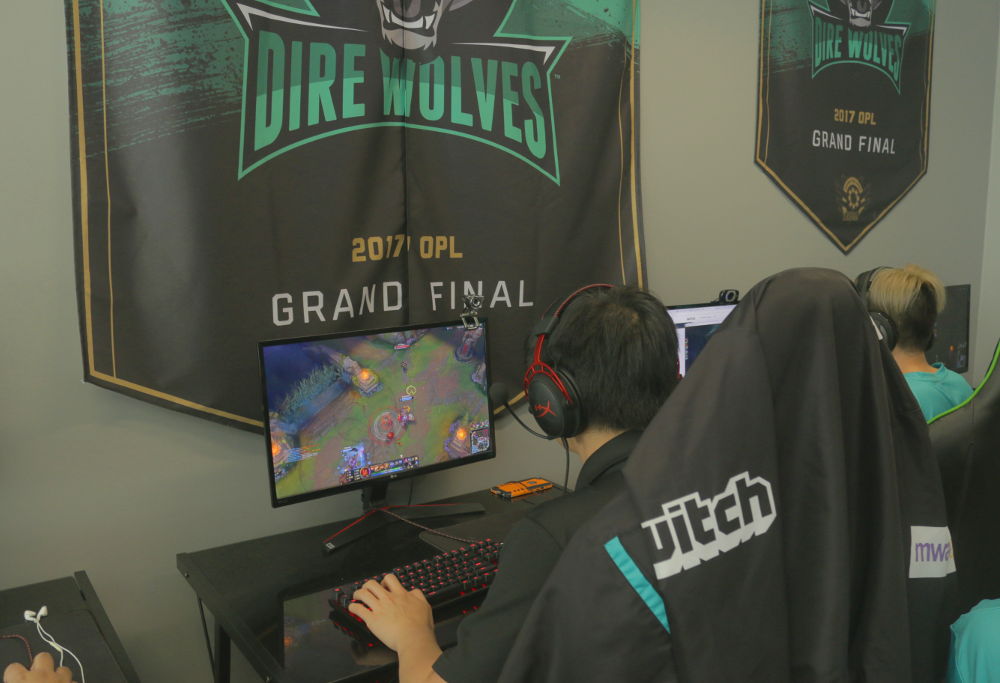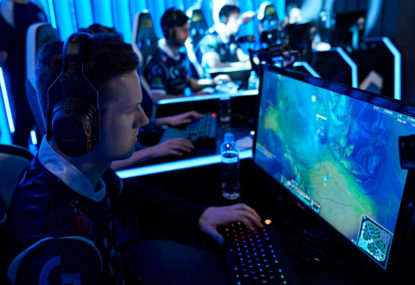Eighteen months ago, the Australian competitive League of Legends scene was a pretty tough region to play in.
Though the players in the Oceanic Pro League (OPL) were referred to as professionals, many were only really playing part time, with other commitments such as work and education still being a primary focus.
One of those teams was the Dire Wolves. They had been a competitive team to that point, often coming in around third place, but they never quite came out on top.
Their rivals in Legacy Esports and Chiefs Esports Club however were consistently the top two finishers in the region.
As such, they consistently had the most opportunities to compete against their international counterparts, and they generally scored the most lucrative sponsorships.
October 2016, though, marked a turning point. Sponsorships can get a team some good gear, and can sometimes can even attract better players, but the backing of Dave Harris, the Managing Director of Guinevere Capital, could give a team a lot more support to invest in their future.
When asked why they chose the Dire Wolves particularly, Harris speaks to the savviness of their CEO and founder, Nathan Mott.
“He was aware that there was a lot more to it than just playing on the rift… he saw the bigger picture,” Harris explains in an interview with The Roar.
In a world where most teams are run by young, ex-pro players – Mott among them – having a broader perspective on league-wide development is a real asset.
Previously the starting Jungler for the team, Mott had built a well-regarded organisation even before he had extensive outside support.
With Harris’ traditional sports knowledge and Mott’s League of Legends know-how, they have transformed the Dire Wolves.
The team has won two OPL splits in a row, and attended three international tournaments. The team has now also had the opportunity to attend a number of boot camps in Korea, where they have trained against the best of the best.
Although many eSports organisations run Korean bootcamps, they’re especially important and effective for Oceanic players.
Australia has two issues in this arena in particular that can’t be addressed so much as mitigated: the population here is simply smaller, so there is a lower volume of raw talent to draw on; and due to being so geographically isolated, the latency involved in playing against other regions without physically being there is so great that it makes effective practice next to impossible.
In addition to training around some of the best players in the world, the Dire Wolves have another advantage coming into this next split: since returning from Korea they have moved their training to the Sydney Cricket Ground’s new eSports High Performance Centre.
Launched in November, the centre performs double duty, allowing the team a clearer separation of their work and home lives as well as giving them access to state-of-the art equipment and facilities.
“The key thing is actually structuring the learning environment, and making sure players get the most out of their training,” says Harris.
“The old style kids would just sit down, playing for 16 hours a day, hoping that with focus or a bit of practice that they would just get better. We’ve put a lot more structure around it, so if you go through a day here… between each game, they’ll look at what they did well, what they did poorly, and what they can do better next time. So a lot of it’s coaching, but it’s not just a former player that knows the technical aspects; it’s actually proper coaching, and facilitating learning by the players.”
Without a doubt, the SCG High Performance Centre is a major boon to the team. In eSports, the approach to date has been to have all the players living and training under one roof, and spending most of their waking minutes honing their craft.
The Dire Wolves’ approach is a significant departure from that; there is still a “gaming house”, but they have no computers in it. Players train exclusively at the SCG encouraging a quality over quantity approach to their training.
That’s not to say that the new approach hasn’t had its challenges. According to Harris, there is a lot of “test-and-learn” in applying the knowledge and lessons from traditional sports to an eSports context.
In one example, part of turning practice into a job rather than a lifestyle involved making training more of a standard, 9-5 affair. The problem was, a significant part of training is playing against other players non-competitively in solo queue, where players did not make the same life changes.
“Sometimes we try to normalise things too much,” admits Harris. “What we quickly learned is that, unfortunately, even if the pro players are doing it, the broader community aren’t, so the quality of the solo queue dropped off.”
Fortunately for the team though, there seem to have been relatively few principles that haven’t translated across, and the occasional misses have been quite easy to rectify.
Still, as the first game of the year approaches, there have been other challenges. Last week, Shern “Shernfire” Tai, the Wolves’ jungler, recieved a two-week suspension for an incident while the team was bootcamping.
With each team only playing ten games in total, this is a central player missing from the roster for a fifth of their season. Not only that, but the first two weeks of the OPL are going to be incredibly important for the Dire Wolves: their first game, and the first game of the split, is a rematch of last year’s grand finals against The Chiefs eSports club.
Bryce “EGym” Paule is a veteran of the Oceanic scene, and was the Chiefs’ support player in last year’s finals. This year, he’s transitioning to a full-time caster position for the league after getting a taste of being on the Riot production team over the last couple of years.
Starting out with the occasional role on the analyst desk between games, this turned into guest-casting games, too, when his playing schedule allowed it.
“I really enjoyed it, to be honest,” Paule admits. “At the end of this year… I wasn’t really thinking about retiring like a lot of people seem to think, but I had a lot of genuine fun on the games I was casting. This is an opportunity that’s coming up right now and may not be there in a couple of years if I do want to do it again. I’ve latched onto it now, so I can see where it goes.”
Although he still gets to play plenty of League of Legends, Paule’s role as a caster involves watching a lot of games from players and teams, as well as staying on top of regular game updates to know what to expect.
Across different regions, casters’ in-game ability varies widely, with many of them gaining the majority of their insight through observation.
For ex-pros like Paule though, they have the additional advantages of not only playing through the changes, but playing at a high enough level that they regularly come across current pros in their games.
Looking forward to the upcoming OPL split, Paule reflected on that first match between his old team and the regional champions. “I think the Dire Wolves vs Chiefs game will be the most exciting… They are pretty closely matched.” One reason this could be such a close match is because, like Shernfire, the Chiefs’ AD Carry Quinn “Raes” Korebrits has also been hit with a two-week suspension.
It’s not just going to be an exciting and well-matched series though. The Wolves and Chiefs will only play each other this once during the split; if they finish with the same match record, as they did in split one last year, the winner of this match will hold the head-to-head and so be granted the higher seed going into playoffs.
It means that there is a lot of pressure all round this game; it will be the first match that Paule casts in his new, official capacity, there are subs on each side with a lot of expectations on them, and if either fails, their mistakes have the potential to come back to haunt the team much further down the road.

(Ryan Nash)
Although the Dire Wolves have been the first local team revamp their training approach and structure, they certainly won’t be the last.
The Adelaide Crows and Essendon Bombers, who have recently become the owners of Legacy Esports and Bombers respectively, have both announced that they intend to develop similar facilities, and if it proves effective, this could well become a new standard in Australia.
But of course, other OPL teams aren’t the only opponents out there. The teams with the greatest successes will also have the greatest challenges, as they are sent to whichever international event is on the horizon.
At these events, the skill level is often considerably higher, with teams that get significantly more practice against one another due to geography or funding.
The introduction of the Rift Rivals tournaments between 2017’s major tournaments gave a much-needed boost in this area. Instead of just the top Oceanic squad attending, the top three squads had the opportunity against the top three teams from Japan and Southeast Asia.
By spreading this international experience across multiple teams who might otherwise not have had such an opportunity means that the flow-on effects of international play are disseminated through the wider league far more quickly.
Although it’s far too soon to assess how the OPL’s chances stack up against the competition — we haven’t had a single regular season game yet, and won’t know who is going to attend the Mid Season Invitational (MSI) for some three months — Paule is positive about the trajectory of the region as a whole.
Even just in the difference between MSI and Worlds, he notes, “After they had their first time there, it’s a much more successful run every [time they] return.”
For now, though, the focus is on this split, and indeed on this week. The Dire Wolves team are aware that they face extra challenges in this early part of the split, but Harris and Mott are confident in the team’s future.
With so many adjustments to the organisation’s training in the offseason, it’s going to be so exciting to see how their play has improved, and to see how it lines up against the changes made by their opponents.
The League of Legends Oceanic Pro League begins at 2pm AEDT this Saturday, January 20th, opening with the rematch between the Dire Wolves and Chiefs Esports Club.
Many thanks to Dave Harris (@daveharrisAUS) and Nathan Mott (@DWRippii) of the Dire Wolves, and Bryce Paule (@EGymLoL) for taking the time to have an interview with us.






























































































